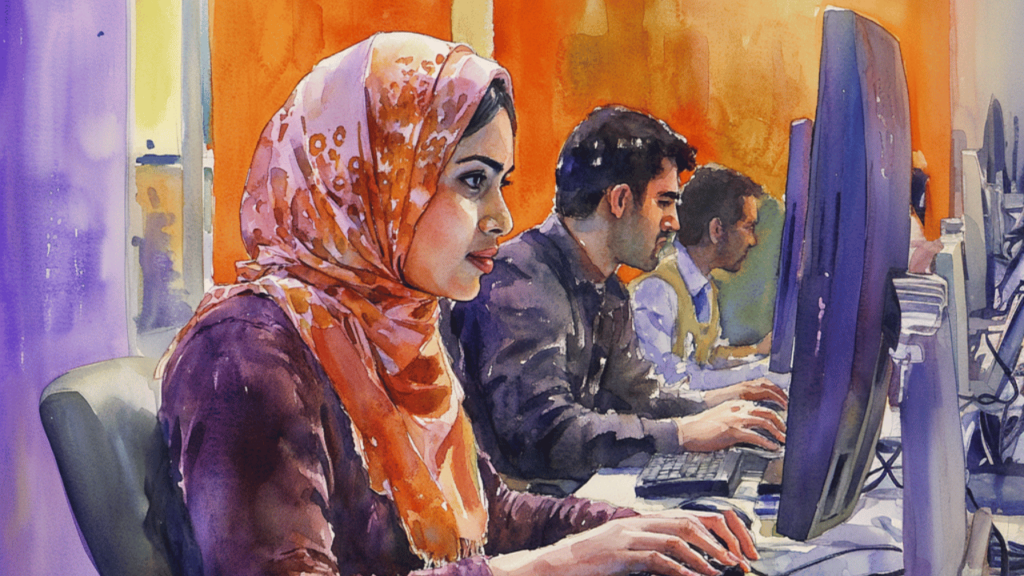Sarah wishes to undertake vocational training at an apprenticeship training center (CFA). Her application was accepted, but when she arrives at the reception, she is approached by the director who informs her that she cannot join the training while wearing a headscarf. The director cites the internal regulations which state: ‘in application of the principle of secularism, the wearing of any ostentatious sign of religious affiliation is formally prohibited, regardless of the training location’.
The managing bodies of CFAs are private organizations (associations, companies, etc.), chambers of trades or commerce and industry, and public organizations (high schools, etc.).
Apprentices have signed an employment contract and have the status of young employed workers in a company, under the responsibility of an apprenticeship master. Apprenticeship contract training takes place alternately in a CFA and a company. The theoretical part of the training is most often provided in a CFA, but can also be followed in a Training Unit (UFA) or Apprenticeship Section (SA) contracted by a CFA, and as such can be provided directly in a company under certain conditions.
What does the law say?
- LAW No. 2004-228 of March 15, 2004, framing, in application of the principle of secularism, the wearing of signs or outfits manifesting a religious affiliation in public schools, middle schools, and high schools only prohibits the wearing of signs or outfits ostensibly manifesting any religious affiliation for students enrolled in public schools, middle schools, and high schools. The circular from the Ministry of National Education dated May 18, 2004, does not mention the specific case of apprenticeship training centers (CFA).
- The Paris Court of Appeal convicted a CFA for discrimination against an apprentice excluded for wearing a headscarf prohibited by the internal regulations, because this CFA did not establish the proselytizing nature of this wearing (CA Paris, June 8, 2010, No. 08-08286; see also the deliberations of HALDE No. 2009-339 of September 28, 2009; No. 2011-34 of March 21, 2011; No. 2011-35 of March 21, 2011).
- The Paris Court of Appeal notes that the CFA was unable to demonstrate that she wore her headscarf ‘ostentatiously and for the purpose of proselytizing’. It further specified:
” The wearing of the Islamic veil or headscarf is a manifestation of usual religious practice in the Muslim religion, whose practice normally falls within the exercise of religious freedom, constitutionally guaranteed as a public liberty. Limitations can thus only be imposed by law, for a legitimate purpose, and only by proportionate means .
Let us recall that the Council of State considers that the mere wearing of a headscarf does not in itself constitute an act of pressure or proselytism (CE, November 27, 1996, Jeouit, No. 170209). - Regarding 15-year-old students in pre-apprenticeship under school status in a CFA, the circular of the Ministry of Education No. 2004-084 of May 18, 2004, specifies that the 2004 law ‘does not apply to candidates who come to take exams or competitive examinations in the premises of a public educational institution’;
- By analogy:
“Therefore, even young people under school status, when they are received in a CFA, are outside the scope of application of the 2004 law and they have full latitude, as well as other young people who attend the center, to wear religious signs as long as there is no security risk or proven disturbance to public order” (Response from the State Secretariat for Employment published in the Senate Official Journal of 09/09/2010 – p. 2361).
What should I do?
If you are denied access to the CFA due to wearing a religious symbol:
- Demand a written and justified notification of the refusal you are facing.
- Consult the internal regulations of the training center to learn about any illegal provisions, knowing that you are not considered as students in the sense of Law No. 2004-228 of March 15, 2004.
- If no provision in the regulations mentions a prohibition on wearing religious signs, this is discrimination that must be denounced.
The internal regulations of a CFA that would prohibit the wearing of religious signs are discriminatory and must be denounced as such in order to be modified by the administration. - Similarly, if the wearing of religious symbols is not expressly and directly prohibited by the internal regulations but the latter generally targets ‘all headgear’, this is indirect discrimination and should be denounced.
- If the prohibition is not related to specific circumstances linked to compliance with hygiene, safety or public order rules, you can present to the management of the training center the deliberations of the HALDE (High Authority for the Fight against Discrimination and for Equality) which has had the opportunity to rule on similar cases.
- In case of persistent refusal from the management of the training center, file an appeal with them and refer the matter to the Defender of Rights.
- Contact Equitas who will provide you with legal assistance and support you in your various steps.
APPLICABLE REFERENCES:
Articles, laws, circulars, directives: Article L. 141-5-1 of the Education Code resulting from Law No. 2004-228 of March 15, 2004; Ministry of Education circular No. 2004-084 of May 18, 2004; Law No. 2008-496 of May 27, 2008 on various provisions for adaptation to Community law in the field of anti-discrimination (Art. 2-2); Articles 225-1 and 225-2 of the Penal Code; Council Directive 2000/78/EC of November 27, 2000.
Conventions: Art.10 of the Declaration of the Rights of Man and of the Citizen of 1789; Art. 9 of the Convention for the Protection of Human Rights and Fundamental Freedoms; Articles 18 and 26 of the International Covenant on Civil and Political Rights of 1966.
Jurisprudence: CE, November 27, 1996, No. 170209; CA Paris, June 8, 2010, No. 08-08286.
Decisions: Deliberations of the HALDE No. 2009-339 of September 28, 2009, No. 2011-34 of March 21, 2011 and No. 2011-35 of March 21, 2011.




